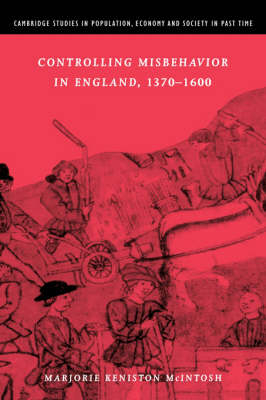
Controlling Misbehavior in England, 1370–1600
Seiten
2002
Cambridge University Press (Verlag)
978-0-521-89404-3 (ISBN)
Cambridge University Press (Verlag)
978-0-521-89404-3 (ISBN)
Through an examination of 255 places in England, Professor McIntosh challenges many historical assumptions to demonstrate that concern with wrongdoing mounted gradually between 1370 and 1600. This important study describes how English people defined and attempted to control misbehaviour during the later medieval and early modern periods.
In this important study, Professor McIntosh argues against the suggestion that social regulation was a distinctive feature of the decades around 1600, resulting from Puritanism. Instead, through an examination of 255 village and small-town communities distributed throughout England, Professor McIntosh demonstrates that concern with wrongdoing mounted gradually between 1370 and 1600. In an attempt to maintain good order and enforce ethical conduct, local leaders prosecuted people who slandered or quarrelled with their neighbours, engaged in sexual misdeeds, operated unruly alehouses, or refused to work. Professor McIntosh also explores who the offenders were as well as the factors that led to misbehaviour and shaped responses to it. More generally, Professor McIntosh sheds light on the transition from medieval to early modern patterns and succeeds here in opening up little-known sources and new research methods.
In this important study, Professor McIntosh argues against the suggestion that social regulation was a distinctive feature of the decades around 1600, resulting from Puritanism. Instead, through an examination of 255 village and small-town communities distributed throughout England, Professor McIntosh demonstrates that concern with wrongdoing mounted gradually between 1370 and 1600. In an attempt to maintain good order and enforce ethical conduct, local leaders prosecuted people who slandered or quarrelled with their neighbours, engaged in sexual misdeeds, operated unruly alehouses, or refused to work. Professor McIntosh also explores who the offenders were as well as the factors that led to misbehaviour and shaped responses to it. More generally, Professor McIntosh sheds light on the transition from medieval to early modern patterns and succeeds here in opening up little-known sources and new research methods.
List of illustrations; List of tables and lists; Acknowledgements; List of abbreviations; Introduction; Part I. The History of Social Regulation: 1. The forms of control; 2. Methodological underpinnings; 3. Social regulation in England's smaller communities; 4. Social concern in other contexts; Part II. Factors that Influenced Social Regulation: 5. Some political considerations; 6. Social ecology I: 'broad response' and 'no response' communities; 7. Social ecology II: analysis by type of offences reported; 8. Ideological/religious influences; Conclusion: social regulation and the transition from medieval to early modern England; Appendices; Bibliography; Index.
| Erscheint lt. Verlag | 20.6.2002 |
|---|---|
| Reihe/Serie | Cambridge Studies in Population, Economy and Society in Past Time |
| Zusatzinfo | 17 Tables, unspecified; 8 Maps |
| Verlagsort | Cambridge |
| Sprache | englisch |
| Maße | 152 x 229 mm |
| Gewicht | 460 g |
| Themenwelt | Geschichte ► Allgemeine Geschichte ► Mittelalter |
| Geisteswissenschaften ► Geschichte ► Regional- / Ländergeschichte | |
| Geschichte ► Teilgebiete der Geschichte ► Kulturgeschichte | |
| Geschichte ► Teilgebiete der Geschichte ► Sozialgeschichte | |
| Sozialwissenschaften ► Soziologie | |
| ISBN-10 | 0-521-89404-2 / 0521894042 |
| ISBN-13 | 978-0-521-89404-3 / 9780521894043 |
| Zustand | Neuware |
| Haben Sie eine Frage zum Produkt? |
Mehr entdecken
aus dem Bereich
aus dem Bereich
eine neue Geschichte des Mittelalters
Buch | Hardcover (2023)
C.H.Beck (Verlag)
CHF 53,20


